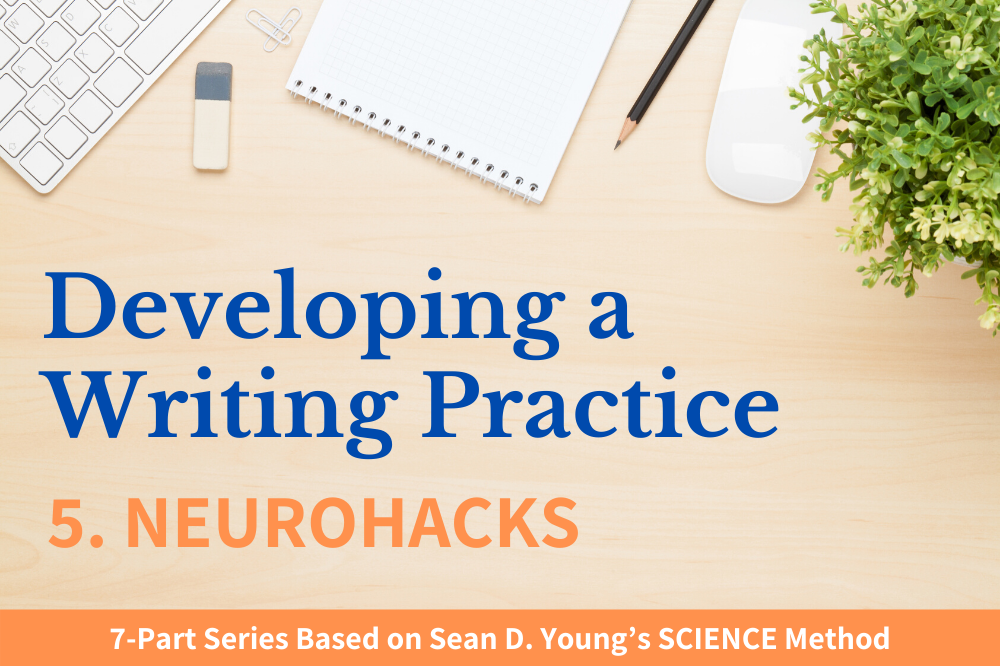
Today’s post is by regular contributor Susan DeFreitas (@manzanitafire), an award-winning author, editor, and book coach. She offers a first 50-page review on works in progress for novelists seeking direction on their next step toward publishing.
In part five of this series based on Sean D. Young’s bestselling Stick with It: A Scientifically Proven Process for Changing Your Life—for Good, we’re taking a look at the N in SCIENCE, Young’s acronym for those strategies that lead to lasting change: Neurohacks.
Young defines neurohacks as a set of psychological tricks designed to reset the mind. The idea is that if you can change the way you see yourself, you can get yourself to establish a new habit.
Of course, changing the way you see yourself is a complex subject—and of all the strategies Young discusses in this book, this may be the most counterintuitive. Because one of the basic principles of neurohacks is that you don’t wait for a change in how you feel to change your behavior; you just change your behavior, and that changes the way you feel.
For example, he says, want to feel like a more generous, compassionate person? Don’t wait until you feel a surge of generosity. Just give money to someone on the street, or make a donation to a nonprofit, or foster a shelter animal. This initial act on your part will send the signal to your brain that if you weren’t a compassionate person, you wouldn’t have done these things, and this in turn will make you more likely to behave this way in the future.
Another example of a neurohack is to create a recurring reminder of the kind of person you want to be (but perhaps don’t quite feel like yet). Young shares the story of a man who found himself struggling in the face of an acrimonious divorce and changed his computer password to Forgive@h3r. After having to type that password in every time he logged in, he began to see himself as a less bitter, more forgiving person, and as a result found it easier to let go of his anger at his ex.
In some ways, the idea behind neurohacks is simple: Fake it til you make it. Or at least, fake it until it feels real, because in some ways, your brain can’t tell the difference.
So: How might these types of psychological tricks apply to the practice of writing? Here are some ideas:
1. Invest in Yourself
Would a person who wasn’t a writer have a subscription to Poets & Writers? Would someone who didn’t write speculative fiction have a subscription to Locus? Probably not. Not only do such industry publications offer excellent information on the craft and business of writing, investing in a subscription like this will offer you a regular reminder of your commitment to writing, as a new issue will arrive each month.
Alternately, you might invest in a nice journal, a fountain pen, a writing conference or workshop—or even, if you’re really serious, a book coach. Any investment in your writing practice, whether large or small, will send the signal to your brain that this is the kind of person you are, and that this is something that’s important to you.
2. Claim Yourself
Many people are reluctant to call themselves writers if they have not yet published, or if they have not yet published a book. But nearly any established author will tell you the same thing: you shouldn’t wait until you’ve achieved these kinds of milestones to claim yourself as a writer, because claiming yourself as a writer is an essential part of committing to the process.
That might mean introducing yourself as a writer when people ask you what you do, though your job may be in an unrelated field. It might mean attending literary events, or joining an association in your field, like Romance Writers of America, or Sisters in Crime. (These are also great ways to connect with others who share your passions, which can be a galvanizing force in its own right—see Part Two of this series, on community).
3. Claim Your Space
Many who struggle to establish a regular writing practice are trying to work at a kitchen table cluttered with bills and homework slips, or a desk covered with tax files. Not only do these sorts of reminders of other (probably more pressing) concerns serve as distractions, they send the signal to your brain that these things are actually more important to you than writing.
Of course, it’s not always possible to establish a dedicated writing space. But if you can, it will send your brain the opposite sort of signal, the signal that this work is important to you— otherwise, why would you have created a dedicated space for it? (And if space is tight at home, remember, Ocean Vuong’s not the only author who wrote his first book in a closet.)
There’s a subtle logic behind the concept of neurohacks that may not seem obvious at first, but these kinds of acts can be very powerful in terms of shifting your self-image from that of someone who wants to write to someone who actually is a writer—and that subtle shift can make all the difference.

Susan DeFreitas is the author of the novel Hot Season, which won a Gold IPPY Award, and the editor of Dispatches from Anarres: Tales in Tribute to Ursula K. Le Guin, a finalist for the Foreword INDIES. An independent editor and book coach, she specializes in helping writers from historically marginalized backgrounds, and those writing socially engaged fiction, break through into publishing.

[…] Getting started is an exciting time, but can be difficult sometimes. Marie Lamba talks about how journaling led her to a book idea, Rachelle Gardner addresses the issue of so many ideas, so little time; Sara Coughlin shares 4 mindfulness steps every freelancer should do before starting their day, and Susan DeFreitas discusses the role neurohacks play in developing a writing practice. […]